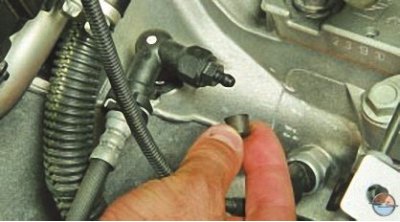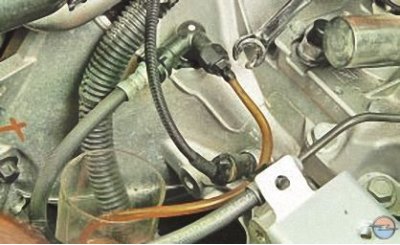In addition, pumping is performed when the hydraulic drive is filled with liquid after its replacement or after repair of system components associated with depressurization.
You will need: brake fluid, bleeder hose, wrench «at 11», capacity for drained liquid.
1. Check the fluid level in the master cylinder reservoir (reservoir common to both master cylinders) and adjust if necessary.

2. Remove the protective cap from the valve to remove air from the clutch slave cylinder.

3. Put a hose on the valve and lower its end into a container with a small amount of brake fluid. Ask an assistant to press the clutch pedal 4-5 times at intervals of two to three seconds, and then hold it down. While holding the hose adapter from turning, back out the valve 3/4 turn. Liquid with air bubbles will come out of the hose into the container.
4. Wrap the valve and ask to release the clutch pedal.
5. Repeat steps 3 and 4 several times until fluid begins to exit the hose without air bubbles.
Attention! While bleeding the hydraulic drive, periodically check the fluid level in the reservoir of the main brake cylinder. Do not allow the liquid level in the tank to fall below 25 mm from the bottom of the tank. Top up the fluid in a timely manner, otherwise, when the bottom of the tank is drained, air will enter the system and pumping will have to be repeated again.
6. Wrap the valve, put on a protective cap and if necessary add a liquid in a reservoir of the main brake cylinder.

Visitor comments